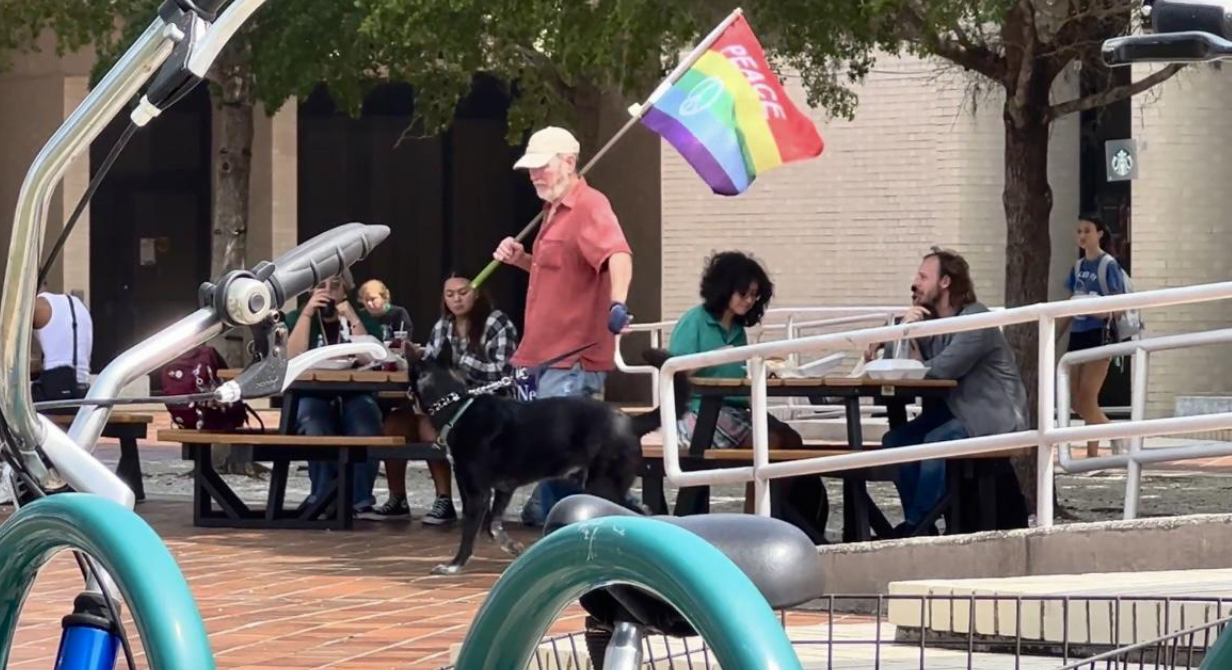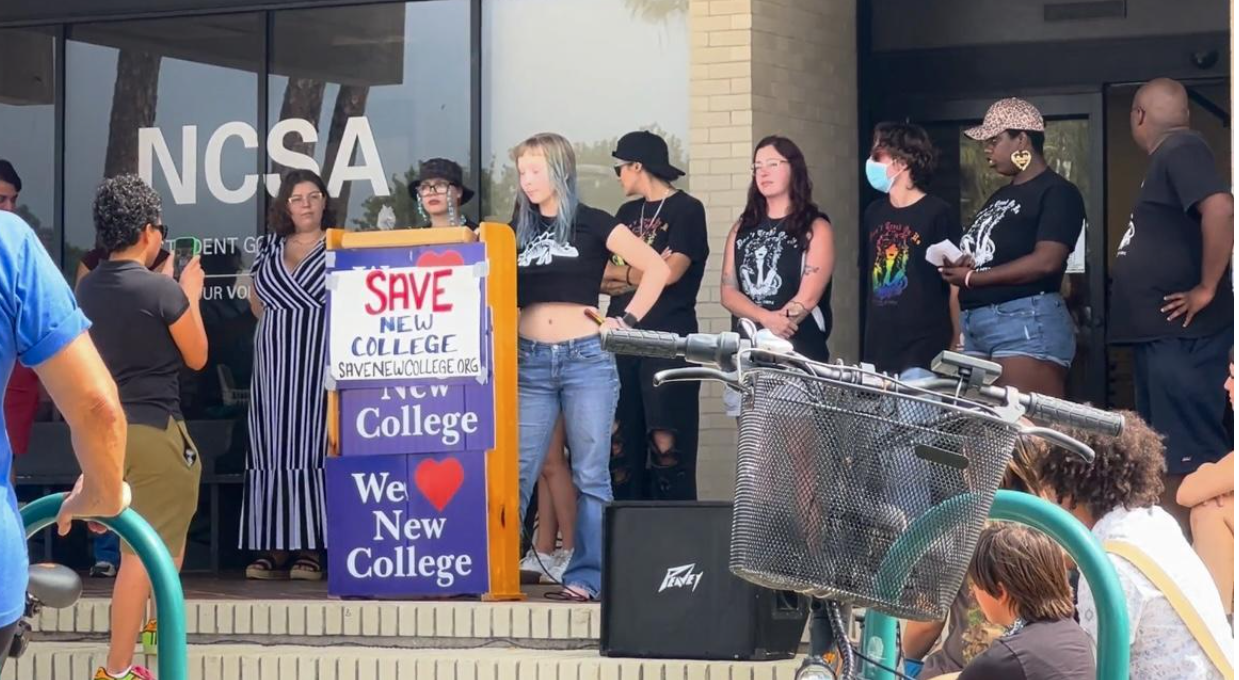Outside Hamilton “Ham” Center, rhythmic drumming drew a crowd to Z Green at 12 p.m. on Oct. 3, just a few short hours before the Board of Trustees (BOT) meeting where the new president of New College would be chosen. Speakers, students and supporters alike gathered once again to show that the flame of fight has not died out. The theme of this rally was “Where’s the money?”
“We need better than Corcoran, we should be demanding better than Corcoran, and I am hoping that we are getting better, and I am hoping beyond all hope that eventually, one day things will get better. Until then, we must continue to demand better, and act better [than] everyone who has put us in this situation,” third-year student speaker Jackson Gillette told the crowd.
On Jan. 31, the BOT voted to fire former New College President Patricia Okker, sparking controversy and uproar among the student body. Since then Richard Corcoran has acted as interim president while the search for a new campus leader was conducted. Students have begun to question where money for existing student programs and research is now, as well as demanding plans to replace lost or reallocated funds.
“Almost half of our faculty are gone this semester, and as Corcoran and the new board only want to hire value-aligned professors, very few people have been brought in to fill these vacancies,” thesis student Chai Leffler told the Catalyst.
Over the past year, many professors have left New College, leaving students lost as they wait for replacements to be hired. Since changes began, New College’s curriculum has been questioned, although no definitive restructures were begun until the Aug. 10 BOT meeting when a motion by Trustee Christopher Rufo proposed beginning the process of terminating the Gender Studies Program. Gender Studies Professor Nicholas Clarkson resigned from the faculty immediately after.
“The academics here are now so inconsistent, that the curriculum has changed three times since I have been here, and on that note, something that has at least been consistent is a dysfunctional administration.” Leffler cited this as a staple experience for those who attend New College. “I personally believe that administrative issues are just as much a part of the student experience as first year orientation, sunsets at the Bayfront or crying in the banyan tree at three in the morning,” Leffler said in their speech. “Every single time, it’s the students and faculty that come together to support each other. That is how I am still able to graduate, not because the admin is helping to fix the problems they caused, but because the professors are stepping up to help.”
New College has traditionally relied upon close one-on-one relationships between students and professors, but with the current influx of new students, class enrollments are beginning to reach high numbers. Leffler continued their speech by pointing out that even though the school has not officially shut down any academic programs, the departure of many professors left returning students with little to no resources in their field of study. This has become a very big problem for current thesising students who must either get to know new faculty quickly or be left without anyone to fill the role at all.
“[The thesis process at New College] is heavily guided, with our professors acting as mentors along the whole way, and as an Urban Studies student, I expected to be guided through this process by someone in my field,” Leffler explained. “Due to the administrative and academic changes at New College and in the State of Florida, this is not the case.” Leffler said the situation has left them “scrambling to figure out how I’m supposed to graduate in May.”

Students spoke out not just about the academic shifts, but also the overhaul of campus life and what it really feels like to be a student on campus at this time.
“The new administration is forcing too much change on the students. This change isn’t good for anyone,” second-year student speaker Xandr Denner said. “Half the student body is stuck in hotels and it leaves campus feeling empty and students feeling isolated.”
Although many students who live in hotels have reported that the living conditions are better than last year, Denner commented on the complaints that have risen about feeling separated from the campus culture and divisions rising among students.
Denner said, “Administration and certain members of the BOT are intent on sewing a narrative of hostility and division. They are focusing on their own goals and the new students that they recruited, and this focus has left returning students in the dust.”
Earlier in the year, New College announced the addition of multiple sports programs including baseball, softball, basketball and more. Issues began when administration shifted housing assignments, leaving many students wondering where they were going to live up until the last minute.
This year, many students were forced to live in hotels as New College closed its PEI dorms due to concerns of mold.
“[The new administration] says they want to foster diverse political beliefs, that’s a lie,” Denner told the group. “They say they are going to figure out housing, that’s a lie. They say they care about professors, that’s a lie. They say no classes have been canceled, but that’s a lie. They say they want to teach the truth, that’s a lie.”
“I ain’t got nothing against athletes, I like baseball, I like basketball, and I love football, so you guys need to start winning if y’all start playing, right? I got a problem with racism, transphobia, and hate and I ain’t saying it to y’all [athletes] but I am saying this is my community,” Sarah Parker with Women’s Voices of Southwest Florida (WVSWFL) stated at the rally.
When conservative politics are brought up, often it intertwines closely with religion. At this rally, Reverend Jay Wolin from the Unitarian Universalist Church of Sarasota spoke out in support of New College, addressing this aspect of the takeover.
“We often hear about religious views from these ultra-conservatives, but there is a large progressive religious voice in Sarasota, and I want to let you know we are here to support you in any way that we can,” Wolin said. He asserted that “our principles are the inherent worth and dignity of every person, no matter what sexual orientation or gender identity, we are here whether you are queer, whether you are straight, we are here for you. The fact that this school has done away with their DEI program tells me that they fear you, they fear the search for truth.”

Additionally, rally participants and attendees had an opportunity to hear from former Catalyst Editor in Chief Sophia Brown (’23), who now works for PEN America. PEN America is a non-profit organization that focuses on protecting the right of free expression in the United States and worldwide. PEN America first made an appearance at New College last spring at the Academic Freedom in the Sunshine event, where the keynote speaker was Jeremy Young, Senior Manager of Free Expression and Education. In his speech, Young emphasized New College’s strong history of academic freedom and free expression.
“[Corcoran] has been the interim president since February, but when asked by our students and faculty what about New College he finds valuable, why should people care about this institution, he didn’t have an answer and instead only spoke poorly of it,” Brown recalled. “What does it mean to be a leader who can’t find anything positive to say about the institution or the people he is leading?
“The faculty and staff who make the college function, teach the classes, manage the campus, work with students, they should be the primary stakeholders for things like changes to the curriculum or course offerings, what resources go where.” Brown continued. “The BOT has a key role to play in shaping the college but it should do so with the best interests of the school in mind, with the trust of its constituents not to carry out the will of the legislature or to impose an ideological agenda.”
She also commented on a perceived shift in the way administration treats the College in a less personal manner than in the past.
“[They have] people who don’t care about preservation, who don’t care about the mission, students or faculty that they have inherited, because these things were never the priority to begin with,” Brown said. “Instead the priority is to cast out the students and faculty who do not fit a particular conservative model and to replace them with those that do.”
After the speakers concluded, many in the crowd made their way to the Sudakoff center to attend the Oct. 3 BOT meeting where Richard Corcoran was chosen as the next president of New College.

